#was that this show was so close to having a more compelling set of heroes than villains and then this bastard walked up
Note
I'm not into comics that much but why do Batman and Superman beef with each other? Like if you two don't kiss each other right now instead of fighting-
Like fuck beating the other to a pulp, just fuck each other already😑
Hi!
It really depends on what media you're following. They don't actually hate each other except in specific works. They're best friends, colleagues and at the very least, consider each other family. Even with the variety of universes in comics, Batman and Superman hating each other is very rare and in specific circumstances with reasons behind it.
Long story short: they don't (beef). They disagree and argue, sure. They're rivals, but in a manner that conveys the utmost respect for one another. Their friendship can turn toxic, too, but it's never out of hate.
Yes, there is initial friction when they start working together. Both come with a different set of values and methods to uphold justice, which is what makes their friendship so compelling. After everything, even when they don't see eye to eye, they support one another and they are there for one another. They show deep compassion and understanding for one another, even without necessarily speaking. Batman is highly observant, and Superman is endlessly compassionate.
I'm too tired to find the examples right now, but a couple of bullet points:
Batman is Superman's hero - Superman has unwavering faith in Batman even if his plans are batshit crazy. I can't find the panels rn, but there was even an arc where Batman had a plan that involved Clark slowly killing himself for a 1% chance (or something ridic like that) of saving the universe. It was horrible, but Clark trusted him no matter what.
When Bruce got engaged with Selina, there was an entire sidestory where they went on a double date with Clark and Lois, and both men went into great depth of why they admire one another and how important they are to each other. The respect between them is immeasurable.
Batman's first Robin (Dick Grayson) was a huge Superman fan, and Superman was an important part of his life. To the point that once he stopped being Robin and became Nightwing, his hero name 'Nightwing' actually comes from a Kryptonian story Superman told him.
Both Superman and Batman's respective families are closely knit, each 'bat' has a 'super' that is associated with them, either on a team with them or as friends. If they hated each other, I don't think their families would be this close-knit.
Superman knows the sound of Bruce's heartbeat and listens for it often.
Batman has a voice tone, or grunts, that is reserved for Clark only. Fun fact, the JL unanimously agrees that Clark is the best at doing the Batman voice.
They founded the Justice League together, along with Wonder Woman and other team variations (usually with the Flash and the Green Lantern).
Even in AUs where they hate each other, or they've grown apart, they still respect one another.
They have multiple comic runs as a duo/partners: World's Finest and Superman/Batman.
In one of the runs above, Superman's cousin crashes to earth and both Batman and Superman become parental figures and argue about raising her until Wonder Woman intervenes. Again, they disagree, but it was more on execution of integrating Kara onto earth.
Anyway, the idea that these heroes hate each other isn't really, at least in my experience with other comic fans, common? Mass media (such as films and video games) has a weird attachment to turning Superman into a villain to fight the allegations that he's boring, but he's actually a compelling character if you (general you, me @ the WB execs.) can get past the weird power-obsession and enjoy characters for their depth.
That said, while I do ship superbats, I have a deep appreciation for the women in their lives, especially Selina (who is able to recognize her feelings for Bruce and how they may not be good for one another) and Lois (who is such a fierce character on her own). They add so much to Batman and Superman respectively, so I whenever I talk about Superman and Batman, I make sure to mention this too.
It's important to me, especially in this ship to emphasize that it's not just about kissing the pain away, but understanding the depth and the history that comes with this relationship. Also, not erasing women for the sake of the ship, too.
Final disclaimer: comics have so many different versions, timelines and resets that someone can easily swoop in and prove me wrong, so please take everything above as my way of enjoying the comics.
If I have the energy, I will try to find the panels, but I am so tired 😭
#anyway i love superman and i love this friendship#my asks#superman#batman#clark kent#bruce wayne#superbats#superbat
59 notes
·
View notes
Text
Welcome to another round of W2 Tells You What You Should See, where W2 (me) tries to sell you (you) on something you should be watching. Today's choice: 킹덤/Kingdom.
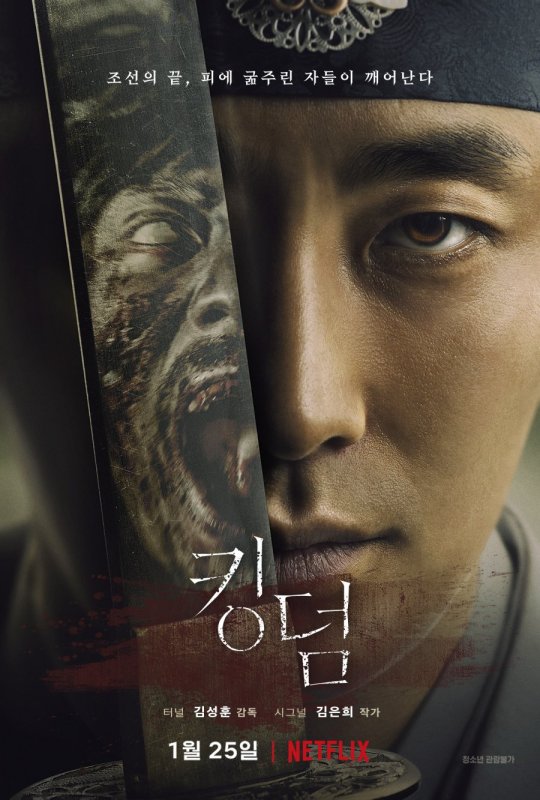
Kingdom is a 2019-2020 Netflix series set in Joseon-era Korea, following the collaborative adventures of an exiled prince, a country doctor, and a scrappy mercenary who's pretty much the only one in this entire zombie outbreak who has a damn gun.
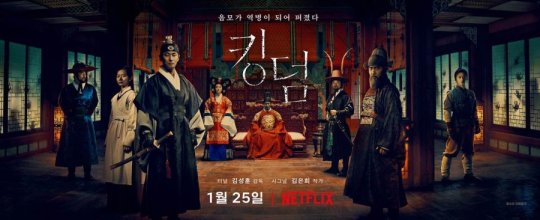
I have very complicated feelings about zombie media. See, in case you hadn't noticed, horror movies are never actually about what they're about. And a whole lot of modern zombie stories wind up being a) metaphors for fears of immigration by mindless subhuman hordes hell-bent on infecting the good, pure people, b) white male fantasies about how the downfall of civilization will put them back on top again and then all you DEI people will be sorry! and/or c) ways to let your protagonists just kill the shit out of a whole lot of humans but it's okay because they're not really human. Soooo yeah. A lot of zombie-flavored things I like, I have to like them despite all that.
But Korean zombie media tends to avoid a lot of these issues. (Maybe because Korea's experience with invasion is less Fox News Lies About Scary Brown Migrant Caravan Again and more [long list of actual historical incidents]? Who can say!) Kingdom is no exception. It's smart zombie fiction, where the zombies are mostly here to make the already-complicated mundane geopolitical situation just that much more of a fucking nightmare.
This is a bloody, violent, grimy, often downright gross drama, so if you're squeamish, you may want to pass on this. If you're into horror, though, and into zombie horror especially, go on and sink your teeth right into these five reasons I think you should watch it.
1. No one here has ever seen a zombie movie
You know how one of the frustrating things about watching a zombie property is seeing a bunch of otherwise competent, regular people act like they had all their cultural awareness of zombies surgically removed, down to making up cute words that aren't "zombie" to keep from saying the word "zombie"?
Everybody in this show has the excuse that they are living several centuries before even the possibility of zombie movies.
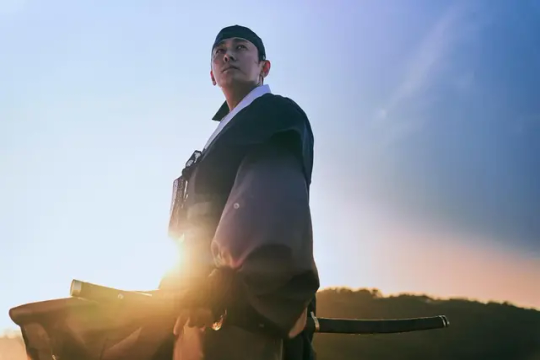
This story starts out pretty standard for a historical drama: a sick king, a pregnant queen, a crown prince in a precarious position, questions of succession, accusations of treason, wealth and class dynamics oppressing the poor, shady backroom politics -- you know, the usual stuff. And it never stops being about all that! It just also has zombies. Evil bastards don't stop being evil just because decomposing hordes are breaking down the door. In fact, that just makes them worse! And our heroes are at ends because they have no natural immunity to the genre they've walked into.
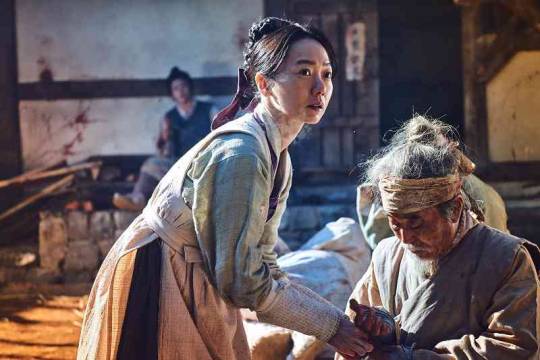
Sure, there are some moments of comic relief, but for the most part, Kingdom plays its premise absolutely straight-faced. How would 17th-century Koreans deal with a bunch of walking corpses? With period-appropriate tools, tactics, and mindsets!
In your standard modern zombie setup, everybody has guns, and then some special badass rolls in with a katana and everyone oohs and ahhs. In Kingdom, the wealthy have swords, the common folk maybe have farm implements, and there's one measly matchlock rifle in the party. For a few lucky headshots, you've got archers. For everyone else, things are about to get real up close and personal.
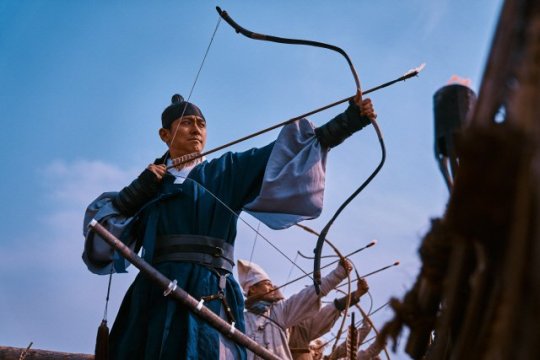
The characters also have period-appropriate worldviews that both inform their reactions to the problem and are frankly bizarre by modern standards. What if you had to deal with zombies in a place with cultural taboos against dismembering or burning dead bodies? What if people felt compelled to treat the corpses of peasants differently from corpses of nobles? What if the scholars won't act in their own defense because it's insulting to ask them to wield weapons? What if you can't ask certain important people certain questions because it's literally treason to do so?
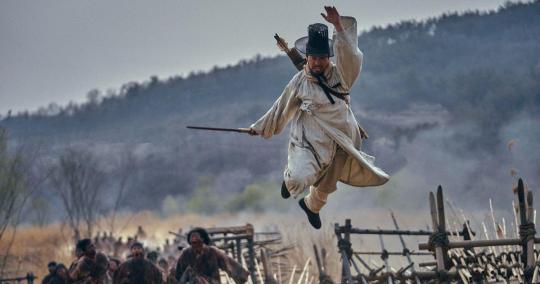
The real moral of Kingdom is that there's not a situation so bad that devotion to Confucian principles can't make it worse.
2. That scrappy bastard
I'm not going to play favorites here-- Wait, what am I saying, of course I am. It's Yeongshin.
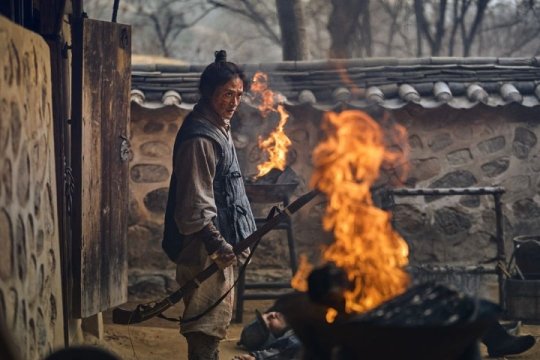
You know how, in any given zombie movie, your hapless protagonists survive because early on they find a party member who's about ten levels higher than they are? That's Yeongshin. He's cagey as hell about his shady past -- to the point where we don't even learn his actual name -- but he's going to come in real handy here, because he is also the aforementioned only guy with a gun, and he fucking knows how to use it.
And okay, I'm exaggerating about the gun shortage, but not by much. Firearms are rare, you need training to be able to operate them, and no matter how good you are, they still take time to reload after each shot -- if they even fire at all. (Also, ignore the part where everyone's aim is far better than shitty matchlock rifling should allow.) Guns are not the go-to weapon in this zombie situation. You can't just shove a bunch of pistols in everybody's hands and count on at least a few lucky shots. You could amass all the period-appropriate firepower you wanted, but without specialists, it'd be useless.
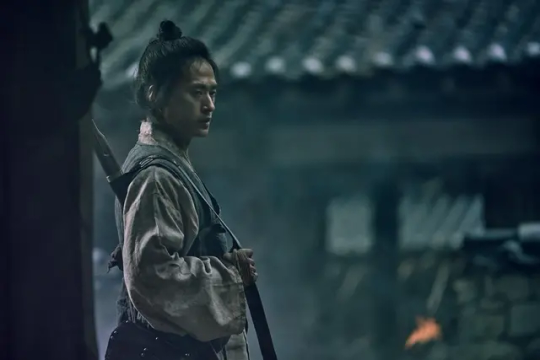
Yeongshin is fueled by some very reasonable guilt, since, uh, a nonzero amount of the shit that goes down is kiiiiiinda his fault. But I love that instead of giving him a death wish, it makes him even more determined to survive and do what he can to mitigate the fallout of his unintentionally terrible decisions. He knows he's far more useful alive, so to hell with taking the easy way out. Whether his opponents are living or undead, he's going to make them wish they hadn't messed with him.
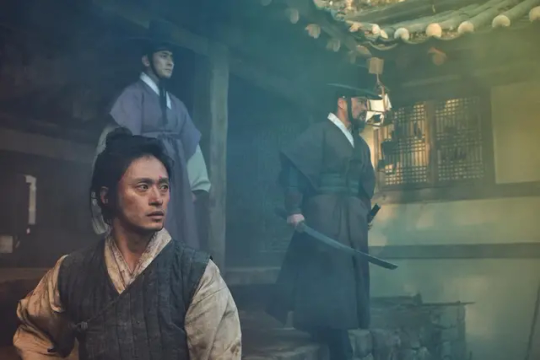
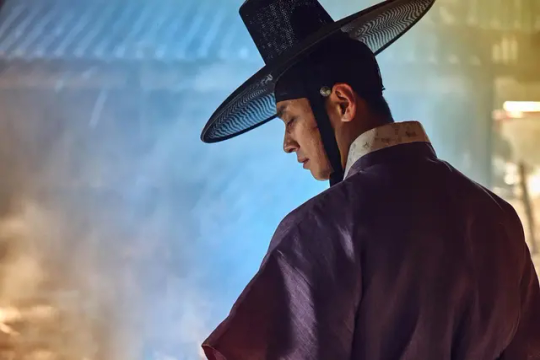
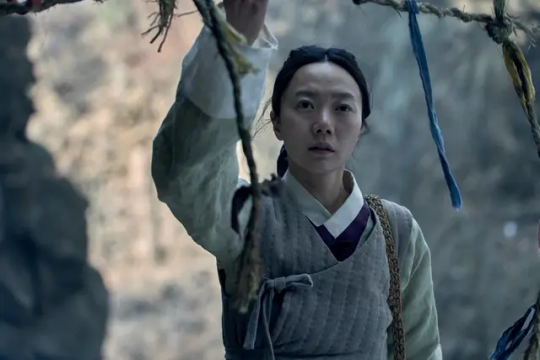
This is a good place to note that the whole cast is great, from the thunder-voiced head of the evil family to the prince's wife-guy manservant to the doll-faced bitch queen. And obviously Ju Jihoon and Bae Doona are captivating every second they're on the screen, because they are absolute acting powerhouses and I love to watch them work. His Prince Lee Chang and her physician Seobi are compelling, memorable main characters who perform the important zombie-movie function of being the people you care about when they get put into dangerous situations.
But I walked away from this unable to stop thinking about Yeongshin. Bare-headed in a world of very meaningful (and often very silly) hats, he's feral and bitey and completely unfit for polite society. So of course he's going to wind up side-by-side with the second most you-need-to-be-respectful-to-him guy in the land.
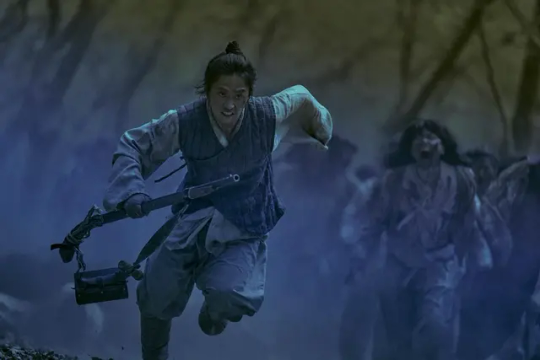
More than anything, I love watching him work. He's a very physical character, but all his stats are in speed and agility, so he will just literally throw himself full-body against doors or into fights and let his momentum do the work. His actor, the handsomely exhausted-looking Kim Sungkyu, brings such a great physicality to the role. Yeongshin may be the Gun Guy, but he's not sniping from the back row. He's right there on the front lines, pulling off stunts none of the other characters would dream of trying. I cannot stress enough what a delight his action sequences are. It's such a good visual counterpart to the zombies, who also have no sense of bodily self-preservation.
And speaking of the zombies...
3. Zombie rules
I find that Korean zombie properties are the best in particular at zombie physics. Their directors seem very interested in pondering exactly what the weight of that many bodies would do. The answer is usually pretty gruesome and visually fascinating!
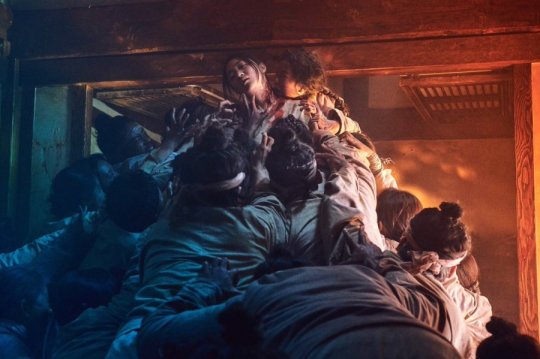
Kingdom's main use of zombies is by volume. While there are a few (memorable!) one-on-one scenes, the show delights in seeing just how many zombies it can fit in the frame. The danger is always from the sheer number of hostile bodies. You can use those numbers against them, if you're clever, but wait too long and you run the risk of being completely overwhelmed.
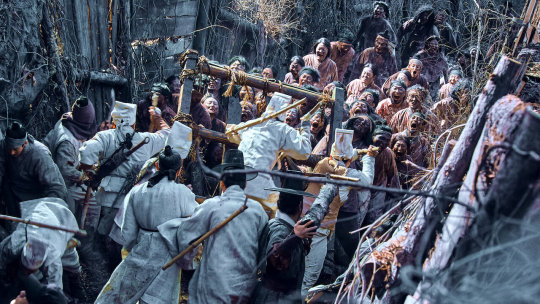
I've seen some people criticize the zombie extras by accusing them of not moving like zombies, which is the kind of nonsense you say when your only exposure to zombies is Slow Zombies. Kingdom's zombies are Fast Zombies -- they don't shamble, they swarm. They all just plow on full speed ahead until something stops them, and they definitely don't watch where they're going. Those extras do some incredible work flinging their bodies over obstacles and into solid objects. I sure hope one of the benefits of all that voluminous period-appropriate costuming is how much good padding you can probably stuff under there.
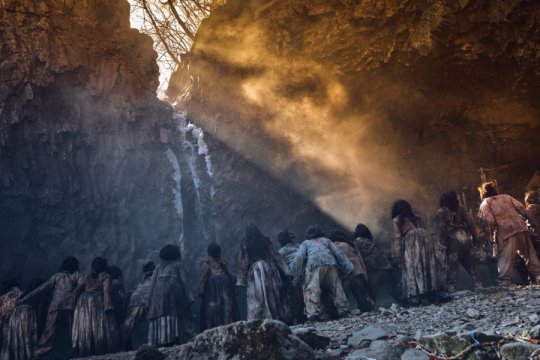
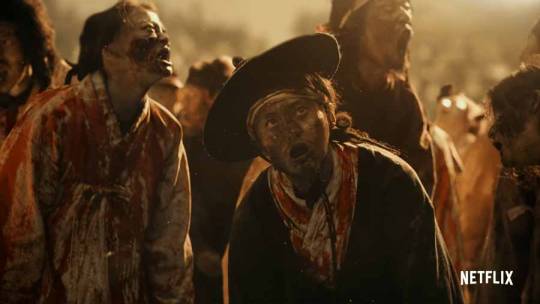
Continuing the thought exercise about what a 17th-century zombie outbreak would look like, Kingdom does some clever things with putting humans and zombies alike in situations you wouldn't find in the modern world, ones made possible only by the time period. I really like that it never forgets that part of the fun of this whole enterprise is making the best of the social and technological concepts that would have been present then. It doesn't feel like a modern zombie movie with incidental hanbok -- it actually makes the most of what a rural medieval setting both gives and takes away.
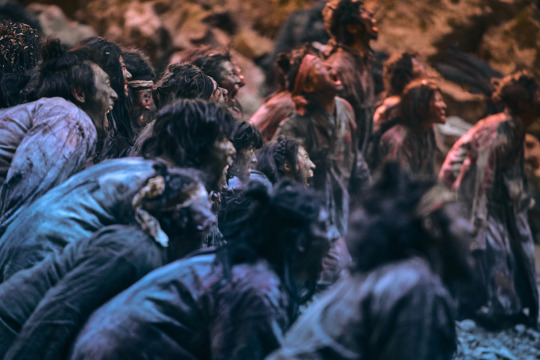
The rules Kingdom makes for its zombies are also an interesting take. You, the modern viewer, know how zombies work in general, but you don't know all the quirks of these zombies in particular, so you're learning at the same time the characters are. And sometimes you learn wrong! Sometimes you have to rewrite your whole strategy because you realize at a critical moment that both you and the characters misunderstood something very badly.
...And yeah, okay, it plays a little fast and loose with those rules sometimes, but so what? You know how this works! You know that the lead actors will dodge more and get bitten less than the random extras will. You know that named characters will last longer than their NPC counterparts. If you're going to hold that against it, maybe horror movies aren't the thing for you. Go do a Rubik's Cube or something.
4. The parts without zombies
Plenty, plenty of people have made the Game of Thrones comparison, which ... yeah, sure, I can see it. It wouldn't have been my first thought, but I get where people are coming from. And you know what, if you're a Game of Thrones enjoyer, you'll probably like this too. It hits a lot of the same beats and has a lot of the same vibes. It's kind of like if you shrunk Game of Thrones in the wash, until there were only two warring families and not a conlang in sight.
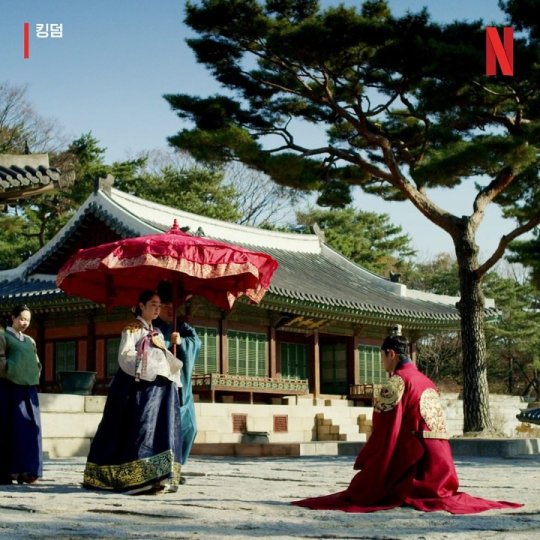
This show isn't historically accurate to the letter -- think of it more as AU Joseon-Era Korea, where specific people are fictional but the larger context is more or less the way things would have been. You never get given a specific year, but from technology and various context clues, you can kinda narrow it down to the 1600s. It never commits to a single year, though, which dodges a lot of nitpicks. Its fictional aspects are nice, too, because that means you don't have to know any real history at all. The show will give you all the information you need to understand the campaign setting, just in case your knowledge of medieval Korean dynasties is not up to snuff.
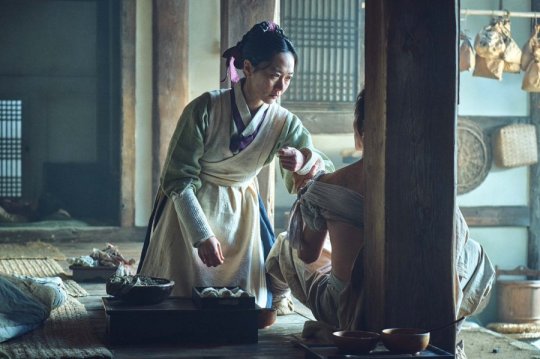
The conceit of the series is that some very specific devious political backstabbing and corruption has been happening since before the show began, making everything vulnerable to catastrophe. Unsurprisingly, the sudden appearance of zombies does not magically mend those rifts and make everyone come together! In fact, the reason the zombies are happening at all is related to these treasonous power plays, and while we never learn the full story (see my later note on the drama's ending), we get a whole lot of it. And it's a good, complicated reason! Here we return to the idea that zombie movies are always metaphors for something else. Set against the backdrop of multiple Japanese invasions during this period, Kingdom sure does have some things to say about the dangers of considering certain lives disposable in the service of the greater good.
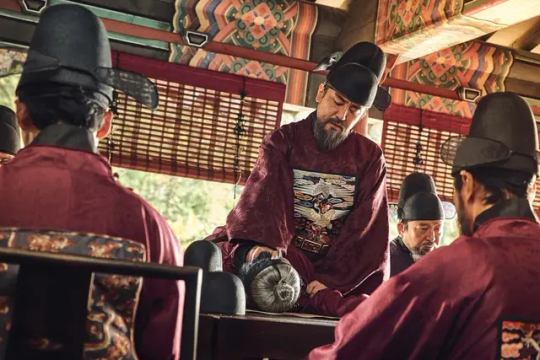
I will be the first to say that IT TURNED OUT MAN WAS THE REAL MONSTER ALL ALONG storylines are tedious, so I'm glad Kingdom didn't decide it needed to beat that drum. The truth is, nobody's surprised when the bastards who have treated other people like shit all their lives continue being bastards in a crisis situation. It's the Joseon Dynasty. Everybody's locked into a rigid neo-Confucianist hierarchy. They don't need an apocalypse to reveal how much the people at the top would sell them all for a single corn chip. They've been clear on that one for a long time.
What this means is, if you're not traditionally someone who goes in for zombie horror, but you like a good political thriller and can roll with some supernatural elements, you might consider giving this one a shot anyway! It's not some hugely complicated and sophisticated plot, but it's still plenty to chew on. (See what I did there?)
5. Time to spend that Netflix money!
This show is gorgeous. It looks beautiful and it sounds beautiful. It's shot beautifully against beautiful sets and even more beautiful landscapes. Everyone's wearing beautiful costumes. What little CG there is is even beautiful. It's just visually a treat.
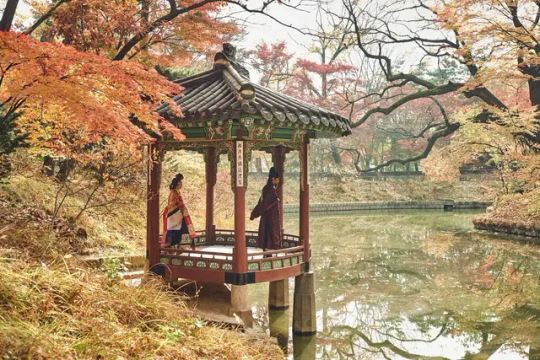
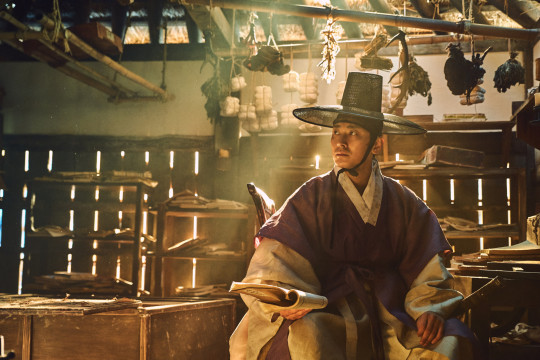
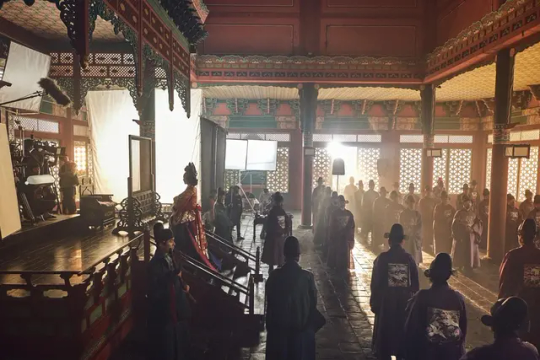
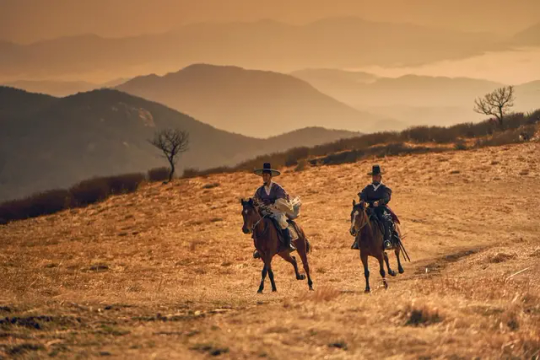
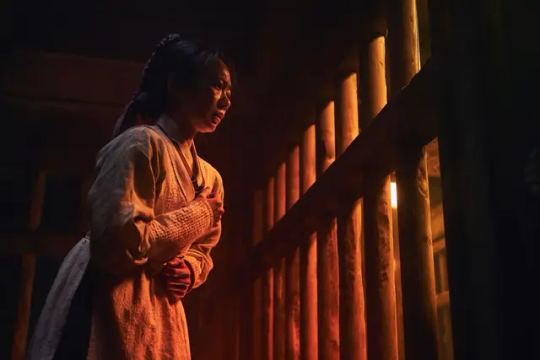
Light is such an important part of the show that I can't not comment on Kingdom's use of it, production-wise. The show is often shadowy as hell, but in a high-contrast way, as opposed to the awkward near-blackness of so much prestige TV. Even when it's dark enough that faces and details are obscured, there are still light sources that provide visual interest. Besides, I'll cut it some slack because it is a horror property. You should be watching it in a dark room anyway! And sure, there's some awkward day-for-night stuff, and transitions around sunset can be downright goofy, but if that's the worst of the jank we have to suffer through, it's fine.
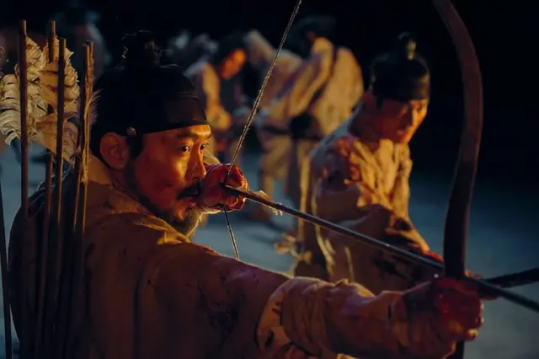
As beautiful as it is, it's also very ugly. The story takes place over a period of time so short that barely anyone has time to change their clothes, much less take a bath. The grime just accumulates: sweat, dust, mud, sewage, smoke, spit, and all kinds of blood and viscera. By the time the story's done, everyone looks realistically beat to shit. (Bless those poor makeup artists, having to keep such close track of all the damage characters have suffered.)
I feel as though I should note for context that while I'm a horror movie fan, I'm still pretty squeamish when it comes to gore. I made it through Kingdom okay, but there were definitely parts I had to watch through my fingers. It hits the realism middle ground that gives me the wiggins, where it's neither absurdly chaste about bloodletting nor dumping comedic buckets of corn syrup on the actors. It suits the tone of the show perfectly! Just, you know, if you're a little tender (like I am), be ready to look away from the screen sometimes.
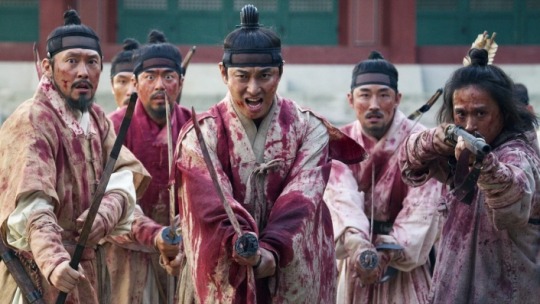
Korean historical dramas sure do have a real advantage on the wig front, in that most everyone is wearing some kind of historically appropriate hat or headband that covers the places their wig joins. And then you have Yeongshin, who looks so good all shaggy because that's clearly at least mostly Kim Sungkyu's real hair.
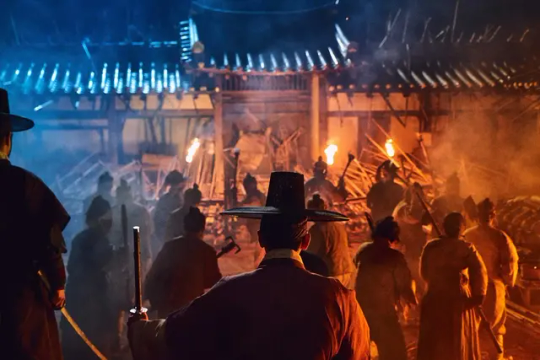
I've seen a lot of shitty low-budget horror in my day, sure -- but I've also seen a lot of shitty high-budget horror, where a production has a lot of money and spends it all on exactly the wrong things. Kingdom uses its funds wisely. It's not extravagant (except for the queen's amazing outfits). There are practical effects aplenty and some beautifully framed shots. It gets a little gimmicky with the camera work in season 2, but you know what? It's fun! The gimmicks are action-movie fun, and I will not criticize something for having fun in the midst of some otherwise grisly subject material.
It's also got great rewatch value. There are just enough secrets running throughout that going back for a second viewing makes a lot of things make more sense -- in, of course, a horrible way! But that's just the way we like it.
caveat: Beware of cliffhangers
The show is two seasons long, and it's clearly set up in expectation of a third season ... which never happened. What did happen was a separate, largely unsatisfying movie that tells the backstory of the cool character you meet in the last ten seconds of the last episode.
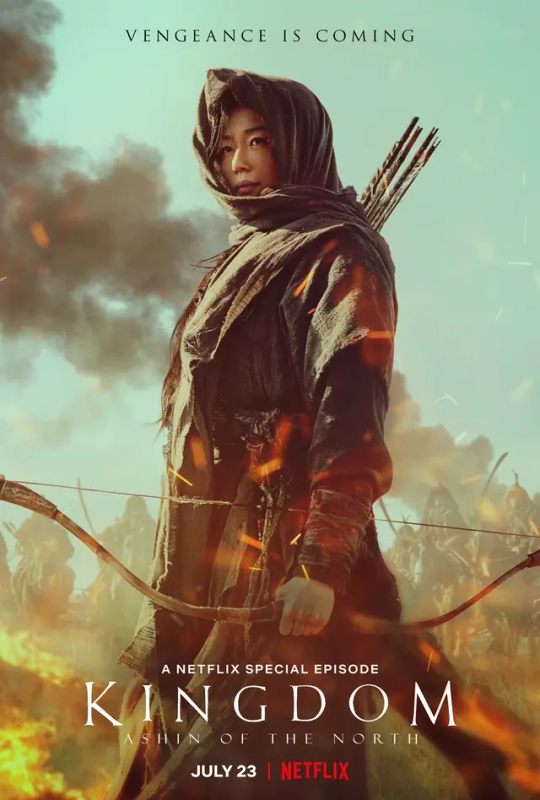
But that's it. There was also a prince-focused prequel planned, but that got scrapped before production even began, and that was four years ago. I'm not holding out much hope that we'll ever get anything more from the Kingdom universe.
I am not super-bothered by this, though, and here's why: The two seasons are enough to wrap up the main political plot. Most of what's left is zombie lore, and I am so bored by zombie lore. Still, would I have watched these characters roll around in that zombie lore for another six episodes? Without question! Are there loose ends I wish had gotten resolved? You better believe it! Do I want to know what the super-duper secret behind the zombies is? I sure do!
But I also don't feel like I got cheated out of an ending. Those two seasons hang on a story that's 90% the political succession crisis and 10% figuring out where on earth this whole zombie thing came from. That means what you get feels like 90% of an ending, which is pretty damn good by my standards.
Still, it's enough of a bummer that I feel I should give a little heads-up about it -- working, as I always do, on the principle that something can't disappoint you if you know it's coming. If you go in with the right mindset, you can be happy with what you get while not being sad about what you don't. And what you get in Kingdom is, in my little horror-loving opinion, worth it.
(Also, am I giving it extra credit points for how it did not sink my ship? Buddy, you better fucking believe I am.)
Ready to watch?
Netflix money means Netflix. It's got two seasons, and then you can make the decision about how much you care about the movie. I found it mostly disappointing with a few really cool moments, so it's your call if that's enough to justify your watching it.
The series itself is a pretty quick watch, too -- twelve episodes total, all 30-50 minutes long once you skip the opening and closing credits. You can blow through the whole thing easily in a single weekend, which is not something you can say about your standard Korean television season of sixteen hour-long episodes.
And then pretty please come back and do fan stuff for it! I couldn't find exactly what I wanted so I had to write my own. One Quiet Night remains one of my comfort fics that I self-soothe by rereading, which may be a weird thing to say about a smutty gay fanfic about a violent zombie drama, but hey, we all make our own fun.
youtube
Also, I know I usually end these with a cute behind-the-scenes photo, but this promo video is too adorable to leave out, so we're going with it instead. It's slightly spoilery for season 1, but not in a way that makes sense out of context. And if you didn't have a crush on Kim Sungkyu already, well, you will after this!
20 notes
·
View notes
Text
For some reason, (don't ask me why) I woke up the other day thinking that Deathbit is going to kill Sunspot in season 2. I'm not sure what brought this on, but the more I thought about it, the more sense it made.
-Gambit was one of the X-men Jubilee was closest with in XTAS.
-After Rogue, Jubilee was the one who was the most broken up about Gambit's death (well, they were the only ones who even seemed to give a shit that he was dead really).
-There was that conversation Jubilee had with Sunspot about how he should "come out" to his parents, so they don't have to bury a stranger if something happens to him. This always seemed weird to me, like it felt out of place unless it was meant to be setting up something.
-Saving Gambit from the Deathbit persona shouldn't be easy. There will need to be drama and high stakes. And he's going to have to do some pretty villainous stuff, otherwise the story will have no teeth; killing someone would definitely qualify. And of all the characters to choose from, Sunspot kind of makes the most sense. He's expendable since he's not a major character, but his death would hurt someone Gambit is close with and set up a story for the future, where Remy has make amends for what he did as Deathbit, which could be a good arc for him and Jubilee.
-I keep coming back to Kurt's line in ep3, "Love is best measured in what we forgive." The line seems odd in a vacuum, but what if that was also hinting at something to come? Like suppose Deathbit does something that the X-men will need to forgive...
-It gets rid of Sunspot, a character that really didn't work in season 1. I didn't buy the relationship with Jubilee at all; they had ZERO chemistry (plus, if you know anything about these characters in the comics, you know how completely wrong for each other they are). His storyline was annoying, unnecessary and poorly developed. And him signing up for Magneto's genocide campaign at the drop of a hat didn't exactly endear him to me either, not to mention his "redemption" and big hero moment in ep10 felt incredibly flimsy and unearned.
-Frankly, the creative possibilities for Sunspot are pretty limited. He hasn't really been a major player in the comics since his run in X-Force back in the day, so there aren't a ton of stories to adapt for him, and most of the stories he does have don't really work for the version of the character we have in the show.
I'd really rather he not stick around if they don't have much to do with him. And I know it sounds kind of dark, but I think there's a more compelling story to tell by killing Sunspot than by keeping him alive.
I wouldn't lose any sleep if they killed him off, and if it created a good arc for two characters I actually care about, then I'm not really seeing a downside here.
#x men 97#gambit#deathbit#remy lebeau#jubilee#sunspot#it sounds dark but i think there's a good story to tell there
28 notes
·
View notes
Note
Hello! Can I ask about character arcs? And maybe some promps please
Hello!
I'm not super good at this but I'll give it a go. Sorry if these thoughts are a little scattered.
A character arc is (usually) a character unlearning a maladaptive approach and learning one that serves them better. That's the purpose of the world to the main character who is in it, to challenge their old ways and facilitate that change. Typically that's the plot, regardless of genre or setting (sequels often explore characters further developing in a changed world). It's considered by some storytellers to be the #1 method to creating a compelling story... but not by everyone, it must be said. Not every story is character-driven, and not every plot reacts to its characters or vice versa. I mean, not every story even involves change. Still, I think the concept of the arc is useful regardless of whether the characters are the core of your story.
An arc is about change. A misanthrope learns to care for the people around him. A closed-off hermit learns to open up. An ageing hero learns to step out of the spotlight and shift to a mentor role. The world pushes them to change their old outlook/behaviour and they push back to find that solution, creating the different elements of the plot itself. The end product of these arcs is usually a character who is better equipped and more fulfilled, but sometimes an arc can lead to their doom.
Change is not necessarily a moral improvement or even a practical one -- characters can become 'worse' in a compelling way when their arc is understandable but saddening. Also any topic of arc can go in any direction due to the nature of maladaptive extremes. Two characters often meet in a healthy middle, which is a good use of a side character.
There's flat arcs too, or boomerang arcs as I like to call them, where a person comes close to the precipice of change and (for better or worse) backs away. Often done to great effect with multidimensional villains who help reinforce/reflect the character's arc. This can also be done when a hero resists allowing the world to turn them evil.
Entire seasons can be dedicated to a different arc in the main character's development as they change and learn how to face each new challenge.
You also might notice that lots of TV shows (especially episodic formats) have a mini character arc as the central plot of many episodes. Lots of children's media and sitcoms are this way and once you see it you never unsee it.
In my opinion, if you want to know how to create a character or a plot, then arcs are a very significant component. Understanding how to put a character through a meaningful arc can be the difference between "interesting premise" and "good story." The most beloved characters often have the greatest arcs, but make no mistake, the greatest arcs are often the simplest.
All that said, "character arc" is a made-up term; it is quite literally what you make of it, so don't take my word as law -- remember, once you understand them, all laws of writing can be broken!
Whew, I think that's everything I know about arcs, condensed.
Some prompts for arcs:
A hero in a healed world learns to finally put down their sword
A cynical town doctor learns it takes more than medicine to help people thrive
A heartbroken musician learns to grow from their mistakes instead of mythologising their broken relationships
A chronic case of 'I can fix them' learns to stand up for themselves
A lonely CEO learns what is more important than success
A conman learns earning trust is better than earning money
A revenge-driven character learns the cycle of violence can never bring happiness
Sometimes you don't know a character until you know their arc. Once you have a good arc nailed down, the rest of your story can slot into place like magic.
- HumdrumMoloch
20 notes
·
View notes
Note
elaborate on the wasted potential? What parts would you have liked to explore?
Hi anon, I could go on and on about the wasted potential of Gyeongseong Creature but I will keep it relatively brief for both our sakes.
For the record, I did like the show, particularly the way it combined history with fiction to tell a story about dehumanized Koreans fighting back against their oppressors during the Japanese occupation of Korea. The titular creature is a physical manifestation of the atrocities committed by the Japanese soldiers against the Korean people and seeing the monster going on a violent rampage against those soldiers feels like an extreme version of the Korean people fighting for their country's freedom. But despite its best efforts, the show never really finds a way to tie the central theme of resistance and freedom to the rest of the plot. The resistance is more or less used as set dressing as neither of the two main characters, Tae-Sang and Chae-Ok, are members of the resistance movement, and the central plot of the season is a heist/horror story about uncovering the mysteries at Ongseong Hospital. The character who actually is a member of the resistance, Jun-Taek, has no real impact on the plot at all and his only noticeable contribution is the explosives used in the finale.
Think about how much more compelling a character Tae-Sang could've been if we'd gotten to see him transform from a selfish man who only cared about his own interests to a proud member of the resistance, finally finding a cause worth putting his life on the line for. By the end of episode 7, I thought the show had mostly achieved this, albeit clumsily, because we never really see why Tae-Sang had a change of heart and decided to be a hero, and if we're supposed to believe it's because of his feelings for Chae-Ok, I don't buy that for one second because the romance was half-baked at best. But then by the end of episode 10, he's once again shrugging off the title of patriot, and this is not a man who is humble, so what gives? Is he meant to be a charming rogue with a heart of gold or a selfish man who will be a hero only if it aligns with his personal interests? I still can't tell and I don't know if the writers themselves even know the answer - they kept trying to tell us he was the former but most of his actions pointed at him being the latter.
Even the horrific creature could've had a genuinely compelling arc if the show had bothered at all to humanize Seong-Sim prior to her transformation. I wanted desperately to root for mother monster to get her revenge against everyone who wronged her, but the show didn't give us any time to get to know her as a human, so it was hard for me to see her as anything but the monster she became. I wanted to believe that she still had some humanity, but the scenes of her protecting Chae-Ok ultimately fell flat because we never got to know the loving mother she had once been. Consider the flashback where Chae-Ok discovers the message her mother left for her on the wall. Now consider how much more impactful that scene would've been if we'd gotten to see it from Seong-Sim's perspective in real time in episode 1. It would've gone a long way in showing Seong-Sim's humanity and it would've made us believe in the love she had for her daughter, a love she would continue to hold onto even when she had lost everything else.
Towards the end of the show, it's revealed that multiple people close to Tae-Sang have all betrayed him at one point or another. But we barely know any of these characters or how they all became a part of each other's lives, and that emotional beat is once again lacking. This is what I mean by wasted potential. The show is full of moments like this, moments that should have been compelling and emotional, and could have been, if they've been tied together with a stronger, more cohesive script.
I don't know if you've watched Kingdom, anon, but it executes a similar concept to absolute perfection (in just 12 episodes and 1 movie) by using the supernatural element, zombies, as a vehicle to discuss its broader theme of hunger, both literal and metaphorical (which I've previously written about here and here). If you haven't watched it, I highly recommend it because it's a fantastic show on its own, and if you liked Gyeongseong Creature, I recommend Kingdom even more as an example of how this show could've been so much better than it was.
21 notes
·
View notes
Note
From your previous ask, about Hunter: "It especially is good for kid's media because while the clone can struggle with the anxiety of it, their friends never have to actually be bad or discriminatory against them because the point is loving yourself for who you are and not who you were made to be."
Personally I think a story in which the clone's friends become mad/discriminatory after the reveal CAN work, on a condition.
If the clone's original is, in fact, their friend's friend, said friends have all the reasons to be mad/shocked at the clone for essentially taking their place***. The friends would not only have to confront an 'impostor', but also deal with the loss of their 'real' friend, meanwhile also needing to reassure the clone they're still valid as their own person (if they also weren't aware obviously).
All of these conflicting emotions can create some compelling narratives imho, and there's not a 'standard' resolution that makes it all go back to normal.
(Btw it's one of those 'what if' post-story aspects that fascinate me about a certain other animated show's finale)
*** Now that I mention it, there's Vee in TOH. Whose potential is thrown in the garbage in the same episode she gets revealed, since neither Camila nor Luz delve into how messed up it is that someone just took Luz's place, and nobody was too concerned about it
It is absolutely a compelling narrative! It's actually theoretically part of the anxiety that Fallout 4 specifically tries to address with its Synths plot. Robots and automatons who are made to be as close to perfect replicas to the original that only the functions specific to them being robots reveals what they are. Otherwise, they appear to entirely be the person you once knew and even cares about you the same way.
Evil clones or even hypnosis are also one episode concepts that plenty of kid's shows might do to shake things up and mess with the character's heads as suddenly one of them isn't acting in their best interest. Just as a fun fact: I actually did a short lived possession thing where Boscha was consumed by a helpful voice in her head. They pushed her to be nicer, make good even with those who treat her poorly and to also let Luz touch her because she specifically only let Amity do that. She was found out once she consumed Boscha entirely because she doesn't say the F word and in the story she was the only one allowed to say it.
Even the death of one you care about isn't new, either in what you described or in other variants. Many a fantasy villain, especially necromancers, have promised the return of loved ones to them in one way or another, with usually the heroes saying that the version they would create or bring back wouldn't be them or that they wouldn't accept them anymore because accepting the offer is inherently a betrayal of the deceased loved one's morals. Or hell, they DO take it and become a pawn until someone else makes them see reason.
Clones, replacement, etc. like that of characters just has a lot of possibility space which is why they're such a beloved trope that's been work shopped in so many ways. Those who consume more speculative fiction than me have probably WAY more angles and the like than I'm even bringing up here.
Now just to address each: I think Anne being a clone isn't as bad for many because it was effectively a revival. It's still Anne through and through after all so while sure, it's a cloned body, it's kind of implied to still have Anne's soul which makes sense with the Guardian's desire to have her take his position. Can that still have angst in and of itself? ABSOLUTELY. Just dealing with the existential crises of having died at all, or the terror that those around you might of ever having to see that again, is absolutely a thing and its own set of anxieties that would be true without the claim of Anne being a clone.
Meanwhile, Vee doesn't technically lose her potential in Yesterday's Lie. Luz finding her convenient is a good excuse for even the most cynical as to why she doesn't get mad at Vee. I of all people don't even consider it a mark against Luz because she had worried about her mom in the past in this regard so her being relieved that her mom hadn't spent months thinking she was dead is honestly just reasonable. Camila is... More complicated. For the fact that Vee and Camila are both side characters more than anything, I think keeping their relationship was honestly for the best. There's no reason to spend an entire episode making us sympathize with Vee only for her then to be tossed to the side or no longer have a home. Honestly, her potential was likely mostly kneecapped indeed by the shortening but also like... Her having to deal with Luz just stepping back into her place would have probably just been one episode anyways and end with everyone happy and okay with it, or claiming they need time but then being immediately fine anyways, because that's just how this show deals with the vast majority of its more complex issues. Anne holds a grudge against Hop Pop about the musical box longer than anyone holds a grudge in TOH. Well, except maybe Luz against herself.
But yeah, clones, bodysnatchers, etc. like that are just really neat because they deal with some really primordial fears we have as a species which makes their potential close to unlimited so long as you're willing to actually do something with them.
======+++++======
I have a public Discord for any and all who want to join!
I also have an Amazon page for all of my original works in various forms of character focused romances from cute, teenage romance to erotica series of my past.
I have an Ao3 for my fanfiction projects as well if that catches your fancy instead.
If you want to hang out with me, I stream from time to time and love to chat with chat.
A Twitter you can follow too
And a Kofi if you like what I do and want to help out with the fact that disability doesn’t pay much.
13 notes
·
View notes
Text
i just saw the marvels and, mutuals im apologizing now for the woman im about to become. i'm going to start using the tag "mcu spam" so you can block that if you want to. my gushing and spoilers are going to be under a readmore.
OH THANK GOD IT WAS GOOD. like yeah i was going to be obsessed with it. obviously. My fucking HUSBAND!!!!! WAS IN IT!!!!!! (for like 30 seconds at the after credit scene.) BUT THANK CHRIST IT WAS GOOD.
first, my coherent-ish thoughts on the movie:
like ok it wasnt high class cinema. it's a marvel movie. but it was still really sweet!!
kamala is still the absolute sweetest kid. ofc she's going to be the heart of their little team-up. and i'm so happy her family was in the movie too. It was such a crucial part of her show, it'd be such a shame if they just totally neglected them. (i mean they weren't like Main Characters but they were still present in general which is nice!) iman vellani absolutely crushed it-- i hope she had fun on set, because it looked like she was having a blast!!
monica's characterization was wonderful too, i loved how her character has stayed consistent from wandavision! (her instincts to de-escalate conflicts is present, thats such a compelling trait for a hero to have.) and her meeting binary at the end broke my heart! Q_Q whatever they're paying teyonah parris isn't enough, the way her voice broke when she was crying made me misty eyed.
and captain marvel!!! i really feel like they put a lot more work into making her feel more like a character this time around. dgmw, i loved captain marvel. but i really feel like they took the time to flesh out her character a lot more this time around!
ok frothing at the mouth time:
him!!!!!!! MY HUSBAND!!!! HIM!!!!!!!!!!!
my irl husband spoiled it for me, which honestly good call I would have Caused A Ruckus if I saw that raw in the movie theater.
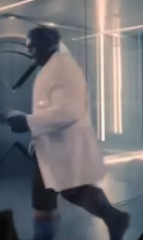
HES!!!! HERE!!!! AND SO PRETTY... NO CLOSED TOE SHOES. CROPPED PANTS. NO SHIRT HIS BIG HAIRY NATURALS. my husband is HERE and he is NOT following lab protocols.
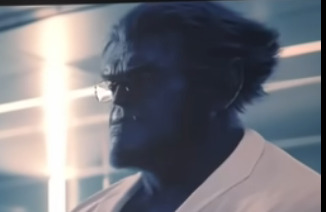
HE LOOKS SO FUCKING CUTE OMG???? his TEEFS!!!!! HIS TEEFIES!!! and his HAIR!!!!! it looks so soft i want to rip wallpaper with my teeth! AND THE hands. his fucking hands. he's got his sharp little CLAWS, HOOWEE.
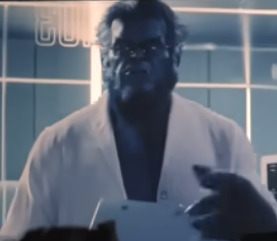
kelsey grammar did a phenomenal job with the voice acting, as to be expected. like. yeah, it does stink that he didn't get blue'd for the cameo but STILL.
"confusion is but the first step on the journey to knowledge."

#mcu spam#IM SO NORMAL IM SO NORMAL IM RUNNING IN CIRCLES ARFARRRF#im howling like a fucking tex avery cartoon im fine#obligatory ''i am glad the cgi animators at disney are unionizing'' disclaimer.
10 notes
·
View notes
Note
This series has had a number of antagonists switch sides [with hints that they would eventually during their story], and yet people still go after the ones that are clearly not meant to be goody-goodies or reforms.
You wanna play around with the concept in fanon, cool. That's what fanon is for. Just understand that there's a reason why certain fanon STAYS fanon.
Yeah like, this series has its good share of villains tuned hero/anti hero and those they can be lovable and entertaining but that's because they were actually formed and written with that in mind, setting it up and developing it well and having it make sense. Those times and the character arcs would have far less impact and meaning if every single bad guy switched sides/weren't so bad after all/became a better person.
I'll never understand the appeal and push for every villain ever to be like that. Like people saying they're fans acting shocked and appalled when villains like Eggman and Fang actually do genuinely bad things in official media is wild, it shows how much modern fandom really don't like actual villains and don't even want them to exist in stories. They're really forgetting how great, entertaining, and important a real villain is to a story.
Many seem to want all media to be no stakes anti climactic pure wholesome love and family and redemption "I can fix them" plots with characters and nothing more. Those things can have their place in fiction like everything and of course it's fine to explore in fanon if that's what they really want to do whether I see the appeal or not, I'm not the boss. But there's just so much more that can be done and explored with storytelling.
So those that have problems with the official media when it has bad guys actually being bad and get mad at the creators and at other fans for creating stuff faithful/closely inspired by that canon, as if it's not allowed and something punishable to be shut down is sad to see. It has a narrative purpose and importance just as much as what they like but they seek to erase it, restrict storytelling, and sanitize characters.
There are plenty of good guys, heroes and anti heroes in the series, we need to let villains be villains. They have their place and worth too and a well written and lovable character doesn't have to be a good person to be such. And ripping them of their true personality and traits that makes them evil, entertaining, and compelling removes so much of their charm to those of us who specifically like them for as they appear in the games.
But the way we're seriously at the point where people only like certain villains for their vastly different fanon versions of them they made up and genuinely get shocked, mad, and appalled when they're actually villainous as they're created to be and intended to stay in the actual official media is really telling of what's become of modern fandom XD and that this is a very real thing worth talking about, especially when it leads to people acting like they were betrayed or owed by official creators or fan creators to appeal to their specific desires, to the point they'll complain or even attack them for writing the characters the way they're actually supposed to be.
10 notes
·
View notes
Text
“Avatar - The Way of Water” review:
Short review
It’s a very pretty movie but the story is too bland and the characters are too underdeveloped to warrant repeated viewings. I give it a B-minus, maybe even a C-plus.
Long review
As someone who actually enjoyed the first movie, I came into the sequel expecting something of similar quality. The first Avatar was not a revolutionary story, but at least it was a solid one, even if it used overdone tropes. And…well, I guess that is what the sequel ended up being. Avatar 2 was also full of overdone tropes, but I didn’t think the story was awful. Just because something is familiar doesn’t mean it was executed poorly. The problem with Avatar 2 is that even though the story is mostly “fine”, it’s clearly not as interesting as the first movie.
Aside from the special effects, what made the first movie interesting was the relationship between Jake Sully and Neytiri. For me, I thought they were pretty solid leads, with Jake being the fish-out-of-water hero and Neytiri being the noble heroine who initially despised Jake. It’s a classic set-up and the movie worked because the story was anchored to Jake and Neytiri’s journey. And, I mean, we can all appreciate a sappy, star-crossed lovers story once in a while.
The second movie doesn’t work nearly as well because it’s missing the type of emotional connection that we got from Jake and Neytiri in the first movie. Technically speaking, Jake and Neytiri aren’t the main characters of Avatar 2. Jake doesn’t really grow as a person and Neytiri is barely in the story. As it turns out, Avatar 2 is more about the younger cast, with the lead protagonist roles being spread out between Kiri (Sigourney Weaver’s new character) and Lo’ak (Blue Naruto Jake and Neytiri’s youngest son). Jake and Neytiri are still there, but it’s their kids that take the spotlight.
Now, is this a bad thing? Well, no, a movie can work with multiple leads, as long as the story is good. And there’s nothing wrong with focusing on different characters in the sequel. The problem is that the kids…well…they’re just not as interesting as the parents.
Kiri’s character is basically James Cameron’s version of Jesus. She was born from Sigourney Weaver’s avatar from the first movie and it’s implied that this was done through the will of Eywa, the planet’s god-spirit. Because of this, Kiri has a close connection to the wildlife of Pandora and even manages to save the day at the end of the movie via her god-powers. Now, this does sound like compelling material. The problem is that Kiri’s character isn’t really explored in the movie, she’s just kinda there. You leave the movie feeling like there was so much more that they could have done with Kiri, which isn’t good considering that the movie sets up Kiri as one of the leading characters.
“It’s because James Cameron plans to tell her full story in the third movie!” Okay, this would be fine if it wasn’t for the fact that a great deal of Avatar 2’s plot revolves around Kiri’s mysterious backstory. So, it’s not really like Marvel setting up their next movie/show in the movie/show you’re currently watching. It’s more like Batman v Superman not bothering to explain why Bruce Wayne had a dream about Superman conquering Earth and why he saw The Flash in the Speed Force telling him to find Lois Lane. You think this plot point is going to go somewhere…and it just doesn’t. That doesn’t make you want to watch the next movie, that just makes you wonder why the writers added it in the story in the first place.
(Sorry, still not over that stupid scene)
What about Lo’ak, the outcast son? Well, his character does get more development than Kiri at least. However, Lo’ak isn’t nearly as compelling as his parents, especially when it feels like the movie wasn’t confident in him being the main character. I’m saying this because Lo’ak is technically the true protagonist of the movie. Most of the movie is about his various fuckups, as well as him befriending the outcast whale and being the indirect cause of the final fight with Blue Quaritch. Lo’ak gets the most character development and, for a significant chunk of the movie, you’re following his journey to make the tribe and his family understand that the outcast, one-finned whale isn’t a bad guy.
The problem is that the movie is insistent on keeping the focus on Jake and Neytiri, as well as having Kiri be the spotlight at times, that Lo’ak never really gets the focus that he probably should’ve gotten. Avatar 2 could have been an action, sci-fi version of Free Willy, but James Cameron either couldn’t keep the focus on Lo’ak or he didn’t want to. So, Lo’ak ends up being underdeveloped.
That’s actually my main problem with the movie. It’s 192 MINUTES LONG, and the storyline still ends up feeling underdeveloped. I didn’t really get attached to the expanded Sully family and the story felt like it needed a few more minutes to be compelling. In fact, when we got to the final battle with the humans, I actually was surprised since it didn’t feel like a proper climax. It felt like we were doing James Cameron’s version of Free Willy, then suddenly being dropped into the middle of Star Wars.
For the rest of the cast, the underdeveloped problems are even worse. I felt nothing when Neteyam, the eldest son, died. Since he barely did anything in the movie, I predicted that he was going to die so that there’d be a tragic death scene to make the audience feel things. Tuk, the youngest daughter, could’ve just been cut out of the story. As for the Metkayina, they were so underdeveloped that I couldn’t even keep track of their names. There was Cliff Curtis chief, Kate Winslet, stupid son, and attractive daughter. Other than that, I couldn’t tell you anything about their characters.
Honestly, the ONLY characters who I felt got any decent character development, and I can’t believe I’m writing this, were Spider and Colonel Quaritch 2.0. I liked that they took Quaritch, the 2-dimensional main villain from the first movie, and gave him dimension. He’s a father who does care for his son, he’s shown to have limits to his cruelty, he had an existential crisis when he learned he was a backup version of the original Quaritch, he was clearly disturbed when he saw his dead body, and he has insecurities since he felt the need to prove himself when he learned that Jake Sully tamed a dragon the hard way. This doesn’t make him likable, but this does make him more compelling as a character.
As for Spider (aka Tarzan-Mowgli), I liked that they didn’t just portray him as loyal to the Na’vi. He may be on the Na’vi’s side, but he still cares for Quaritch since that’s his biological father. He even got along with him during the scene where they’re practicing the language. It makes Spider a flawed protagonist, someone you can root for but acknowledge that he’s not perfect. Obviously, him saving Quaritch is going to bite the heroes in the ass, but you get why Spider did it.
With all this being said, I did have other problems with the movie that isn’t about the story/ character development. The movie was too long, especially when most of the plot was meandering around. The attempts at social commentary were clunky. It’s nice that James Cameron attempted to tackle harder topics, but the race angle doesn’t really work when Jake Sully’s character literally transferred his brain into the body of a Na’vi. If you were to apply this to real life, that’s like if a white person’s brain got inserted into a Native American person’s body, and the movie treats this as them becoming a “real” Native American. The set-up just doesn’t work as serious social commentary, which makes Avatar 2’s attempts at commentary a bit cringeworthy. And then there’s the world-building issues that arise from the attempts at social commentary. What I mean is, it’s now canon that the blue people can be racist towards each other if you’re the wrong shade of blue. However, in the scene where this happens, they’re all speaking English. It’s a jarring scene because they’re talking about something that’s Pandora-centric and with no humans around…but in the language of the humans. And the Na’vi DO HAVE their own languages! So, what the fuck?
Now, what else did I like about the movie? Well, I can appreciate the ambition. There’s clearly a vision here and it’s nice to see James Cameron really give it his all for this movie. And, of course, the special effects. This movie is absolutely carried by the special effects, especially since there are so many scenes where you’re just captivated by the beauty of Pandora. The original score is pretty good, being a mix of majestic beauty to match the nature scenes and bombastic epicness to match the war scenes. And, last but not least, a lot of good performances from the entire cast. It’s nice that the acting really came through, even though most of the cast were acting through motion capture.
But even with the positive points, this is probably a one-and-done for me. The movie just isn’t interesting enough to watch a second time. And it’s actually frustrating to think about since the movie cost around $350-400 million dollars. Yes, most of it went into the special effects, but you’d think that James Cameron would’ve hashed out the problems in the script.
#avatar#the way of water#blue people avatar#avatar the way of water#avatar 2#james cameron#movie review#film review#jake sully#neytiri#miles quaritch#kiri#lo’ak#neteyam#sigourney weaver#avatar movie#avatar 2 the way of water#avatar 2022#na’vi#avatar pandora#miles socorro
53 notes
·
View notes
Photo

“Two eyes watched them from between the leaves, sparkling from the sunlight...” (3/5)
During the applications period, we'll be posting a part of a Sheik fic every week, written by our writing mod! Click here for part two
Applications will remain open until May 9th, 11.59pm PST
Two eyes watched them from between the leaves, sparkling from the sunlight, and for a moment they were all Link could make out. Then Sheik made a noise—a kissing noise, followed by their gloved fingers brushing together as they extended their hand—and after the eyes seemed to regard the two of them, it slowly made its way out between the leaves.
One paw breached the cover first, spotted brown and white, and it hesitated for a moment in the air before pressing on the ground. Then, after a moment of movement, the other paw revealed itself–then a nose and a set of ears.
It was a creature Link had never seen before—likely due to what appeared to be a secretive nature—but he had to admit it was as adorable as it was mysterious. While it tempted him to get up and approach it, he felt compelled to stay still and wait as the creature slowly inched its way across the grass, eyes flicking between Sheik’s hand and eyes. Finally, as it neared the last couple inches, its eyes settled on Sheik’s fingers, and all movement paused as it sniffed at their fingers… before suddenly, it closed its eyes and pushed its head against Sheik’s fingers, and a rumbling noise that seemed entirely too loud for its tiny size erupted.
Sheik hummed, clearly pleased, and turned their hands to move their fingers back and forth. First, they worked at its cheeks, then moved to the spot behind its ears, only to move back along its cheek to the underside of its chin. Then it flopped over on its side and Sheik chuckled, glancing at Link with what appeared to be an excited expression on what he could see on their face, before they added their second hand to the mix.
“Do you know what this is, Link?” They asked as Link slowly pushed himself up to a proper sitting position. Ignoring the pain in his leg was easier now, especially since he had something else to look at that was much more interesting.
“No,” Link said, leaning slightly to the side to get a better look. It had flopped on the ground with its back facing him, and he could no longer see its face. “But it’s cute.”
“It is,” Sheik agreed, smoothing their fingers over its fluffy fur. “This is a cat. Well—a kitten, rather… it doesn’t look close to a year old, but it’s not terribly young either.”
Kitten. Link mouthed the word to himself, finding it strange, yet fitting. There were no kittens in Kokiri Forest—just Deku Babas and one big nasty Mido. He shivered at the thought of Mido finding one, wondering if the boy would subject a kitten to the same treatment he had brought onto Link.
The heavy sigh escaped him before he realized, and immediately he felt eyes on him. There was no reaction at first—Link hoped Sheik would either ignore it altogether or think it had been the wind. However, Link would not be so lucky; Sheik scooped the kitten up in their hands and clutched it close to their chest before sitting down fully on the ground, legs crossing in front of them.
Then came the dreaded question; “What is it, Hero?” And Link found himself sighing yet again before looking up into ruby red eyes.
“... I was wondering what Mido would have done with a kitten if we had any in Kokiri Forest,” He explained. Sheik nodded slowly to show they were listening, but said nothing more. Continue. So he did. “We had no pets. We were all focused on having fairies instead.” Rustling came from his shirt as Navi moved to peek over the edge of his collar, so he lowered his hands back down to the ground to prop himself up once more and let her see. “I bet he would have been mean.”
The corners of Sheik’s eyes crinkled ever so slightly in what appeared to be a wry expression before they looked down at the kitten, fingers curling in and out underneath its chin repetitively. It seemed to like it because the rumbling noise grew louder and it bared its neck even further. Sheik quickened their motions.
“You’ve spoken about Mido before,” Sheik said. “He’s the Kokiri who bullied you all the time?” While it sounded like more of a statement than a question, Link nodded anyway, thinking back on all the times he’d gotten into fights with the ginger.
32 notes
·
View notes
Text
assorted adolescence touga thoughts, in mock q&a format because that's how i've been organizing this in my head:
q: so he's dead, right, what was the whole deal there to start with?
a: as i see it, the literal events are: shiori and utena were both close to touga as children, and both idolized him. one day, juri began to drown in a river. touga saved her, but died doing it.
q: ok, but that seems like such a convoluted premise. why?
a: i think it very cleanly sets up shiori and utena as rivals and foils; they both share more than they differ by, and this is the connecting thread. they both are haunted by the ghost of touga.
for shiori, touga is what she could have had — the kind of person she was owed by the system. she plays her part and gets a good, honest man back. in this way she externalizes the loss, and places it on juri. if touga cannot be her prince, juri will have to be.
for utena, touga is who she could be. a selfless hero, the noblest prince. she internalizes the loss — rather than impose the role onto another, she takes it upon herself.
q: but why is touga selected for this? this seems like the role akio played in the show, not touga.
a: i would say that toga and akio play extremely similar roles in adolescence; dead princes who's absences continue to haunt the narrative.
q: but why have both?
a: they represent the conflicting halves of the prince; the prince is all of the noble masculine urges, the chivalry and protection and honorable defense. he is the gentleman. touga embodies this side. the prince is also the ultimate abuser — the embodiment of all horrible deeds enabled by patriarchy. akio embodies this side.
neither, however, are characters who get to live in this story. they are both memories of characters; post-images transformed through trauma and a desire to conform the world to the way one feels it ought to be.
q: so you're saying touga isn't real?
a: of course he isn't. he's not even a ghost. he is a self-projection of utena and shiori. he is a memory of someone who never existed. of course he haunts them. he is an impossible ideal.
q: what does this say about akio, then?
a: i think akio is played the same way, but with less screentime, and less oblique framing. we learn how he dies; we learn how his actions shaped a major character (anthy), and we continue to see him post death, at the end of the film. the akio at the end is not akio; it is the specter, the memory of him which still looms over anthy. utena must shake touga to realize herself. anthy must shake akio.
q: this is all well and good, but i feel like we've ignored actually talking about touga?
a: we have. we've simply talked about how others react to their projections of touga.
q: then what is there to touga himself?
a: the major component of touga's characterization comes in the field scene. it's a harsh scene, and one that feels distinct among the scenes of the movie as being very untied from the main show. it's not a reorganization of the visual language and structural form — it is it's own scene, played out in its worst detail.
q: why would they do that?
a: i first take a divergence to say that i don't like the time-loop theory. i don't like the theory that this movie is a direct sequel to the series; that this is the students reliving the world of ohtori. but such a reading gives a compelling way to view this scene. to tip my hand, it's the reason i'm making any of this post at all.
the scene in the field is one of extreme sexual violence. though it may be pushed out of frame, it is directly clear what is happening, to this kid. he is sold from his parents to an abusive man, and that man sexually abuses him. one might then note that in the show, touga and nanami are abandoned by their parents into the world of ohtori. you may note also how acutely akio grooms him. you may lastly note that he finally sees through the facade, and abandons his post as prince.
in such a way he dies.
in such a way, these closely mirror the events of the movie. i think the scene in the movie holds its own, but it also reinforces his arc in the show. it's so different because it is a masking of the former's events.
q: but you don't like that reading, generally.
a: no, i do not.
q: nanami is also abandoned by her parents. why doesn't she get such an upgraded treatment from the movie?
a: misogyny and hatred of me specifically. but also, her appearance in the movie is not just a throwaway. she appears as the cow, as she did in possibly her most iconic episode, in the form most heartbreaking to see, as it shows the way that women such as her are raised to be nothing more than effective livestock to the men in their lives. that she is only a cow now shows how deeply she has continued into that trap.
q: i don't think it's that deep. i think they just thought it was funny. why'd you have to go a whole paragraph on that?
a: because touga's trauma also occurs on a farm, among another species meant to simply be harvested and consumed. brother and sister both alike condemned.
q: why is shiori a butterfly, then?
a: because shiori is the reactionary feminine; the woman of and for the system. the system enables such violence against touga. she knows this, and does nothing. she simply remains a witness.
q: let's circle back. let's say you reject the time-loop reading. how do you interpret touga's trauma?
a: another lens to see touga here is to come back to his role as the dead prince. he is the haunting of utena, which sparks her forward into identity. this is the role that anthy plays in the show: in such a way, touga here becomes both parts prince and rose bride.
q: yet anthy remains. and she remains the rose bride.
a: because of course, none of these touga's are real.
q: can you be less pithy?
a: anthy and touga play the same roles, but anthy inspires real coming of age because she is real, and not a distorted memory.
q: we're about out of time. any closing thoughts?
a: water & death in the movie. touga drowns. akio poisons his own drink. and a third.... in the flower garden, just before the dance... anthy picks up the axe, and moves to behead utena... before bursting the water main. but in this moment, i think, there is a mini-death within utena. the mini death of the prince.
q: alright that's it, i'm leaving.
a: good bye. i'm stuck here forever
1 note
·
View note
Photo

Review // The 1975 - The O2 - 12 January 2023
For the Evening Standard. Read online.
Few frontmen polarise opinion quite like Matty Healy. The greatest popstar of his generation or an irritant of epic proportions depending on who you ask, there’s absolutely no denying his notoriety, not least because his antics during The 1975’s most recent live dates have been the talk of TikTok for months.
Pulling up in London on the same day the band were nominated for three BRITs – including Album of the Year for 2022’s Being Funny In A Foreign Language – the playfully-titled ‘The 1975 At Their Very Best’ tour more than lived up to its billing. Over the course of two and a half hours, fans were treated to some truly theatrical staging, a plethora of huge hits and A-list interval entertainment courtesy of Taylor Swift.
Playing out across a set cleverly replicating a two-storey house, the first half of the show turned all perceived notions of arena rock on its head. Devoted almost exclusively to material from their latest LP, it saw band members stationed in different rooms while Healy roamed the set playing the role of louche rockstar, mumbling, chain-smoking and alternating swigs from a bottle of wine and a hip flask. Impressively, none of these affectations distracted from the music, be it the piano-powered groove of Oh Caroline, About You’s slow-burning shimmer or the stunning vocal harmonies that closed out When We Are Together.
Nevertheless, it was an enjoyable if worryingly convincing portrayal, made doubly disorientating every time he broke the fourth wall by eyeballing an artfully positioned video camera, embracing a stagehand, or by explicitly acknowledging the artifice in lines like, “So here we are, method acting.” The performance reached its famously surreal climax with Healy alone on stage, stripped to the waist, devouring lumps of raw steak and performing press-ups before crawling into a TV.
Preceding a more straightforward second act in which Healy switched back into conventional frontman mode, Taylor Swift appeared through a door, strapped on an acoustic guitar and gave her latest smash Anti-Hero its live debut, before covering early 1975-track The City. Any worries that the band had been upstaged by the world’s biggest popstar were instantly allayed by the barrage of big singles that followed, including fan favourites Robbers, The Sound and It’s Not Living If It’s Not With You.
“The thing about us is we just keep getting better, baby,” Healy had bragged following Chocolate, displaying some of the cockiness that his critics find so maddening. And yet on last night’s evidence, he’s right: The 1975 might just be the most compelling pop band on the planet right now.
#live review#live reviews#tearsheet#tearsheets#evening standard#the evening standard#the 1975#being funny in a foreign language#dirty hit#the 1975 at their very best
3 notes
·
View notes
Text
What I read in May 2024
Hummingbird Salamander by Jeff VanderMeer - 4.50/5.00

This book is the embodiment of the feeling that the world is ending, and you have to go to work tomorrow.
This is a tense eco-thriller with a messy, complicated main character. The book follows an unreliable narrator, security consultant "Jane Smith," while she blows up her life to follow the mystery surrounding a taxidermied hummingbird in a storage unit. The main character is neither likable nor particularly relatable and I love her for it.
The writing is beautiful and the book is fast paced and surprisingly easy to read. The action scenes are brutal and visceral, there was one scene in a warehouse that was horrifying and I could not look away.
The ending is a little disappointing, but I still loved the book as a whole.
Fugitive Telemetry by Martha Wells - 4.00/5.00

This was a fun little murder mystery that was unfortunately hampered by being a midquel. I appreciate that some of the humans were less stupid and annoying. I'm still not very interested in action that happens mostly in Cyberspace, but there was less of that this time around.
Jade Legacy by Fonda Lee - 5.00/5.00

This book pulls the camera back and spans decades in the life of the Kauls and brings the Green Bone Saga to a stunning conclusion.
The characters are so deep and complex. I love watching them make choices, even really bad choices, because it's what's consistent with their character. Even when they're not always likable decisions. Seeing Wen come into her own and take over pop culture was a neat storyline. Anden growing more comfortable and confident in his own skin and his skills as a doctor is such a big change from the unsure kid he was in the first book. Even though you start to feel his age, Hilo is still a terrifying badass and his moments of good strategy show how far he's come. I liked watching the next generation grow up and find their own place in the world. Watching the Kauls shape the city streets and eventually their country as a whole is so compelling.
The antagonists are fascinating and you really do have the feeling that if this story were from their point of view, they would be the heroes. I liked the parts where Jeun teamed up with the new Horn of the Mountain clan to solve bigger problems.
Bero remains my favorite little cockroach man. He should be dead. He should be dead so many times over. He's responsible for so much shit. But he's just some guy. He's just the worst little guy.
The passage of time in this novel lends it a great sense of scope and scale. Even though it's over seven hundred pages long, it feels like it goes by too quickly, in a good way. You just want to linger with the characters you've come to love for just a little while longer.
Borne by Jeff Vandermeer - 4.75/5.00

What can I say? I needed another hit after Hummingbird Salamander.
This post-apocalypse throws the reader right into the deep end with little explanation and I love it. Set in the ruins of a city ruled over by the giant mutant bear Mord and the specter of The Company, the protagonist Rachel scavenges an organism from Mord's fur and against the wishes of her partner, takes it in.
Borne starts out surprisingly cute and charming, to the point where you can almost forget that as good as it is at imitating humans, it isn't one. His close bond with Rachel is what holds this story together, even as that bond becomes strained and uneasy. The end of part two hits like a truck, especially because you already know what's going on, but to see it said out loud is devastating.
Vandermeer is so good at writing toxic, but compelling people. And as the story progresses, you see Rachel and her partner Wick drift apart and come back together on a brutal trek across the city.
There's so much of this book that winds up being simultaneously gross and beautiful. The urban warfare between Mord and his smaller clones and The Magician and her fucked up mutants is fascinating as a backdrop for the story. Even amidst the giant bears and shapeshifting anemones and leviathans, the most surreal bits of the story wind up being the flashbacks to before the world ended.
I also loved the bestiary at the end, complete with illustrations.
The Obsidian Tower by Melissa Caruso - 3.50/5.00

After really enjoying Swords and Fire, I was excited to start Rooks and Ruin. While I don't think that the sequel series is quite as good as the original, I appreciate that I don't feel like I need to have read the first series to know what's happening.
I appreciate that the author doesn't waste time and just gets right to the plot. I really like that while Caruso's heroines both greatly value diplomacy, Ryx feels very different from Amalia. Vaskandar feels different from Raverra and the setting, a mixed up castle added onto by the whims of witch lords, was really cool. I like how aware Ryx is of the political realities of her standing, their world, and her friendships. Ryx is very sheltered, so you understand why she's sometimes too trusting and I appreciated the instances in which her trusting nature comes back to bite her.
That being said, I feel like Ryx trusted the Falconers too quickly and her bonds with them don't feel earned. I also wish she felt more like the other Vaskandrans.
Legacy of Kings by Eleanor Herman - 1.00/5.00
Cards on the table, I am a board certified, card carrying horse girl, so I'm naturally biased towards Alexander the great. So when I say that this book is probably read to people at CIA black sites, I mean it.
The characters are all whiny and annoying and too many of them have POVs. Jacob and Hephestion are both really stupid and fall for the dumbest tricks and traps. Katerina is aggressively bland and kind of a bad friend. I sometimes forgot that Zofia existed outside of her chapters, which have no impact on the plot. Alexander is whiny and I do not want to hear him talk about how hot is mom is again. Cynane is the only character I liked, if only because she's so edgy she loops back around to being hilarious.
The plot is kind of all over the place and lacks a good sense of time or scale. Things just kind of happen, then they work out fine. I don't think that the hunger games sub-plot is necessary. Katerina has a voyage to an old mentor to learn to use her powers and an entire training montage nearly entirely off page, only to come back for the last battle, all in the last fifty pages.
0 notes
Text
'As a famous tortured poet once said, “It must be exhausting always rooting for the anti-hero.”
She’s right, it is exhausting, especially for those of us who have watched a lot of prestige television in the past couple of decades. Pop culture has given us a lot of great, complicated characters to ponder — our Tony Sopranos, Don Drapers, Walter Whites and Logan Roys — but also might have saddled a generation of viewers with a case of anti-hero fatigue.
A compelling anti-hero places the viewer in a bind. These protagonists are charming and charismatic, but usually flawed in obvious and irreparable ways. Since the stories paint such rich portraits, however, we cheer them on despite, or in some cases because of, the qualities that make them reprehensible.
But we can’t just like them, can we? We have to look in the mirror and ask ourselves serious questions about why we like them. So these days, whenever a big new streaming show gives anti-hero vibes, I wonder, can I just enjoy the series or do I have to do a bunch of introspective work afterward?
The character of Tom Ripley presents an interesting twist on the anti-hero template, because he is explicitly not likable. Not unlikable, exactly, but more so characterized by an absence of likability.
It is difficult to imagine anybody identifying or empathizing with Ripley, and yet the story, based on the 1955 Patricia Highsmith novel “The Talented Mr. Ripley,” has been adapted for screens at least five times, most famously in the 1997 Anthony Minghella film of the same name and most recently as “Ripley,” an eight-part Netflix series starring Andrew Scott in the title role.
What about the character keeps filmmakers and audiences returning? “Ripley” does not answer this directly, but series creator Steven Zaillian more than justifies his revival of the material. Photographed in sumptuous black-and-white and driven by a darkly compelling lead performance, it is surely among the most exquisite streaming series ever produced.
As in the other versions of this story, “Ripley,” set in the early 1960s, follows a small-time New York hustler who is sent to Italy to convince the layabout son of a wealthy industrialist to come home. That son, Dickie Greenleaf (Johnny Flynn), has been living handsomely off his trust fund in the gorgeous seaside town of Atrani with his girlfriend, Marge (Dakota Fanning).
Tom arrives and is entranced with their leisurely existence. He patiently insinuates himself into Dickie and Marge’s lives, getting close enough to enjoy their largesse but not close enough to reveal what he actually wants, if anything.
Scott, known to peak-TV viewers as the “hot priest” from “Fleabag,” makes his character’s actions compelling while draining them of any discernible motivation. Is he in love with Dickie? Is he just lonely? Is he going to con them, or worse?
It is difficult to discuss the plot in depth without delivering large spoilers, but much of the series involves Tom traveling around Italy, impersonating Dickie and trying to evade authorities once a series of decisions forces him to kill to cover his tracks.
But for all the romance and beauty Zaillian’s camera finds in the streets of Rome, the canals of Venice and the museums of Milan, the contents of his protagonist’s head remain inscrutable. It is never clear what we are supposed to think of him. The viewer experiences anxiety and relief on his behalf, but roots neither for nor against him.
Ripley’s elusiveness makes the character an appealing canvas upon which to project the anxieties of whatever decade produces a new adaptation. In the Tom-Dickie “situationship,” we see a series of all-too-modern binaries: the scammer and the scammed, the identity thief and the catfished, the desperate hanger-on and the influencer.
The emptiness at Tom’s core is a container into which an audience can pour whatever it wants, a reflection of how easy it has become to curate whatever version of ourselves we want the world to see and to create whatever reality we want to experience. Disposing of a body, however, seems to be as difficult as ever.'
#Andrew Scott#Steven Zaillian#Ripley#Netflix#Patricia Highsmith#Anthony Minghella#The Talented Mr Ripley#Marge Sherwood#Dakota Fanning#Dickie Greenleaf#Hot Priest#Fleabag
1 note
·
View note
Text
Film Friday: A Quiet Place
This week's movie is another favorite of mine, the 2018 horror/thriller about a family eking out a living in the shadow of an apocalypse where alien invaders hunting by sound have functionally made the Earth their hunting grounds. It's a movie that is frequently spoken of in terms of the "gotta be quiet"-gimmick and the logic of its worldbuilding, but I feel like considerably less attention has been paid to the story and the characters, and that really is a shame. I hope to remedy this in whatever small way I can. As usual, here be spoilers. If you care about the review part this movie is an absolute stone-cold banger and everyone should watch it. The exact reasons why I think this follow below the cut.

Lee and Evelyn Abbot are managing the post-apocalypse just about as good as one can expect. This despite the grief from losing their youngest, Beau, to the kind of tragedy that strikes unexpectably yet inevitably. The family's two older children, Reagan, who is deaf, and the nervous Marcus struggle with grief and the constant pressure of having to live a life in silent mode. Meanwhile, Lee and Evelyn are, perhaps unsurprisingly, mostly concerned with preparations for Evelyn's pregnancy to come to term, since completing a birth and nursing a child through its early days without producing much sound is a challenge indeed.
A Quiet Place builds a compelling day-to-day setting, showing the various measures the Abbots have taken to keep themselves silent and safe. Lee in particular have been tracking the local alien hunter population as he can without endangering himself or his family, and he keeps a keen ear on the radio waves, just in case his family aren't the only one who made it.

The peril in A Quiet Place is interesting to me because while part of it is the quiet the Abbots have to live under on pain of death, it is not the only thing ratcheting up the tension. A Quiet Place knows that the way things go wrong in situations like these aren't big and showy, it is disaster building up by inches, rounding errors in otherwise perfectly serviceable plans adding up no matter how careful you are. You're only human, and to err is so incredibly, incredibly human. The entire movie serves, from a tension perspective, to set up the final sequence, where enough things that were planned for go just wrong enough to land our heroes in hot water. It's not a grand disaster, it's not a new, more perceptive monster, it's just the right things happening at precisely the wrong time. Yeah, there are coincidences, some diabloi ex machina to complicate things, but the main thrust of the story isn't that these specific things would go wrong, but that eventually, enough wrong things would happen at once.

Before I go on to talk about the emotional core of the film, I should speak (not so) briefly on how language is used in the film. Seeing as Reagan was deaf also before the apocalypse, the Abbots are all proficient in ASL, which needless to say comes in handy in the "make noticeable sound outside and you're dead"-post apocalypse. However, what's subtly tragic is that the Abbots, sans Reagan, still have their most emotional talks in spoken English. While they all speak ASL, talking about their emotions, fears and hope all happen in spoken English, either in quarters so close that whispering is sufficient, or in the proximity of natural sources of noise, such as a waterfall.
This isn't done with any ill will towards Reagan, she isn't present for these conversations so it's not like they speak to exclude her, so it's more emblematic of how the family, particularly Lee, doesn't connect emotionally with his daughter on the same level as the rest of his family. This is, granted, a problem with many sources, as they both feel shame for not preventing the tragedy with Beau, the aforementioned language split, and there's probably some gender business in there too.

This isn't to say Lee doesn't love his daughter, but it seems like he is bad at expressing it. His repeated attempts at making a functioning hearing aid for her can be read as an attempt to bridge the gap. Similarly, I suspect that taking Marcus to the excursion to the waterfall and not Reagan is an attempt to "save" that trip with Reagan for the time when he has managed to construct a hearing aid good enough to allow her to hear him. Now, while I think this is an admirable instinct from Lee and that all of this comes from a place of love, it's also undeniably Lee's biggest character flaw. As it so happens, this flaw is also an integral part of the scene that takes this movie from Good to Great, namely Lee's last stand.

This scene starts near the tail end of a harrowing chase. Marcus and Reagan have found (temporary) safety from the monsters in a truck at the top of the hill. The Monsters are close, and even if Reagan were to disengage the handbrake and let the truck roll down the hill to the Abbot Farm proper, they would be out of the frying pan, into the fire. Enter Lee. He tries to fight the monster that threatens his children but is, put plainly, bodied. There isn't anything he can do for his children, he has failed them. Except, that's not entirely true.

Lee makes eye contact with Reagan, and, with large and intentional signs, signs to her what he should have told her before, what he should have told her every day in a million ways, in all the ways Reagan could understand it. "I love you. I have always loved you." With his final message to his daughter delivered, Lee Abbot does the last thing he'll ever do, the only thing he can do. He screams. A furious, terrified primal scream that has been brewing deep in his chest since the day Beau died, making DAMN sure that every monster within hearing range comes for him and him only.

The movie doesn't end on that, as there is some more business with Reagan finding out that feedback from her hearing aid is uncomfortable enough for the monsters for them to drop their guard long enough for Evelyn to blow it to smithereens, but the emotional climax of the story has passed. The storm has been weathered, and actor/director John Krasinski sends us home with a triumph and a hope for the future. It's perhaps a little cheesy, but after a tense, emotionally draining experience like the movie has been up to that point, it is a great coda to see Emily Blunt kick some ass with a shotgun.

A Quiet Place is one of those movies that I enjoyed upon first viewing for the sheer captive atmosphere of it, and while my esteem for it have only grown through the years, there's no denying the viewing experience is spectacular. The sound mixing is made with a focus on quiet and ambient sound, yes, but it also does a good job of filling the soundscape and make the silence feel tangible. Seeing this movie in a theater was one of my favorite movie going experiences, if nothing else for the collective sigh of relief once the credits rolled. I can't be sure in retrospect, but I think I didn't even hear people eating popcorn when the movie got going, it truly was captivating. I recommend A Quiet Place no matter where you get the chance to see it, but some sort of home theater setup (or a cinema if you happen to live close to one that shows anything but the current blockbusters) is surely the ideal way to watch this particular flick.
#film friday#a quiet place#horror film#post apocalyptic#This is another one where I feel like I'm leaving a ton of stuff out#Like all but one of Emily Blunt's cool parts#the sequence with the birth and subsequent prolonged monster escape are masterfully tense#and like 90% of it is Blunt acting her entire ass off#but there's just no escaping the gravity well of that final scene with Lee#It's beautiful and tragic and the acting is so good both from Krasinski and Simmonds#it's one of those scenes that work as a thesis statement for the movie all on its own#and it recontextualizes a lot of it for me
1 note
·
View note
Text
John Lloyd Young - Jukebox Superhero In Vegas
Not all heroes wear capes.
Sometimes they wear a suit and tie as they rescue classic songs, using the power of the microphone to make them fresh and relevant for an audience of all ages.
John Lloyd Young did just that at The Space in Las Vegas this past Friday evening, for those of us there in person, and for others livestreaming from all over the world. It's a special magic that knows no bounds.
He came out like a thunderbolt to open his Jukebox Hero set with "Lightning Strikes", in signature shades that added a little bit of mystery...a quality of all good superheroes. He then moved into another side of this set with "Oh What A Night", with everyone singing along and feeling the joy.
JLY explained that Jukebox Hero meant a couple of different things. One was that he would be performing popular songs from the past that we all used to put a quarter in the jukebox to play, to pay tribute to the originals while doing them his way. The other takes its meaning from the term "jukebox musicals" - with Jersey Boys being the most successful of the genre. Considering that JLY won a Tony Award for his brilliant portrayal of Frankie Valli, it makes him a jukebox hero of the highest degree.
Accompanying him this evening was the outstanding band comprised of Keith Hubacher on bass, Mark Ferratt on drums, and musical director extraordinaire Chris Lash on piano.
We were treated to plenty of hits from both sides of this coin. Classics like "Hurt So Bad" and "Ooh Baby Baby" also came with stories about singing for/with Little Anthony and Smokey Robinson, and showed off opposite ends of the spectrum of his incredible vocal range. "In The Still Of The Night" and "Show And Tell" also displayed not only the versatility of his voice, but the depth of his emotional range as well.
JLY performed a classic from another singer with signature shades...his powerful "Only The Lonely" would make Roy Orbison proud. He also did a much lesser known Orbison track called "Say No More", tearing your heart out as he went through every emotion possible.
There was also a plethora of Jersey Boys material, along with stories from filming the movie and more. These included "Big Girls Don't Cry", "My Eyes Adored You", and "Can't Take My Eyes Off You"...which JLY makes special every single time, as only he can.
Among our favorites that he also performed were the soulful "Since I Fell For You" and his compelling version of "Unchained Melody". A recent addition, "The Air That I Breathe", is both powerful and ethereal at the same time. The title is ironic, since JLY's rendition takes your breath away.
No show would be complete without JLY making his way through the audience, and we were all thrilled to be personally serenaded with "Hold Me, Thrill Me, Kiss Me" and "Cara Mia". Running around the entire room singing takes a lot of stamina, but he makes it look and sound effortless. And we definitely appreciate the effort!
We closed out the evening with "Sherry", but in a different, unforgettable way. Four local Las Vegas voice students joined JLY on stage to back him up as the Four Seasons. I'm not sure who was having more fun - JLY, the students, or the audience! They all have incredible voices, and I see bright futures ahead for them.
So heads or tails, either side of this coin is a winner. Save up your quarters to see John Lloyd Young perform wherever and wherever you can. His superpowers with a song will leave you astounded, completely satisfied...and wanting to be in the venue where it happens every single time.
1 note
·
View note